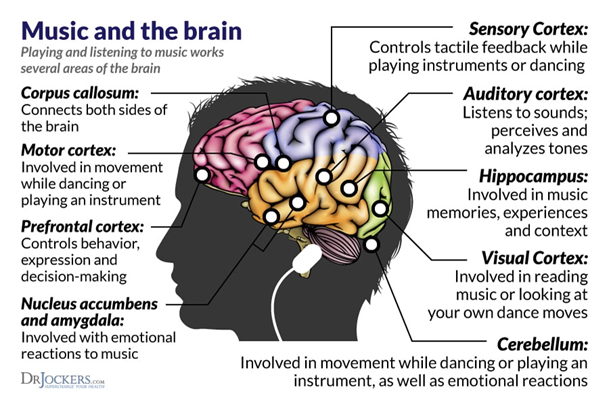Why is music such an effective therapeutic intervention in dementia support?
The answer to this question is largely due to the way that music is represented in the brain.

Music is represented in all the main areas of the brain, including those that are involved in memory, language, emotion and movement.
This means that even when the brain has undergone significant damage and the ability to understand or use spoken word has been impaired, perhaps because of a progressive dementia, people often retain the ability to respond to and understand music until very late stages of the disease.
Music can also be used to stimulate these different brain areas and be used therapeutically to help encourage different responses according to need.
For example:
- Songs can be used to encourage speech
- Rhythmic music can be used to encourage movement where spoken instructions are perhaps no longer understood
- Music can be chosen to encourage memories of events in people’s lives or reinforce a sense of identity reflecting where a person comes from, or
- Support emotional regulation, helping to reduce anxiety in difficult times and restore a sense of wellbeing.
Different types of memory
We have different types of memory, depending on the type of information that is to be stored. In some of the types of dementia, including Alzheimer’s disease, explicit memory is often severely damaged, that is the type of memory where we try to consciously recall events or facts from our lives. Whereas procedural memory, which is a long-term more subconscious learning of complex skills, e.g. riding a bike or playing a musical instrument, is often preserved into very late stages and can be utilised to help reflect personal identity and stimulate skills. For example below, a former prima ballerina living with Alzheimer’s disease begins to dance Swan Lake on hearing the music.
Perhaps most importantly, music can be used to maintain a connection with and strengthen relationships. People can be at risk of become increasingly isolated, communication and mobility can become more difficult, apathy and depression can set in as memories fade and the activities of daily living become more difficult to complete. But through using music or song, a means of communication which can still be understood and responded to naturally relationships and various skills can be maintained and strengthened.














